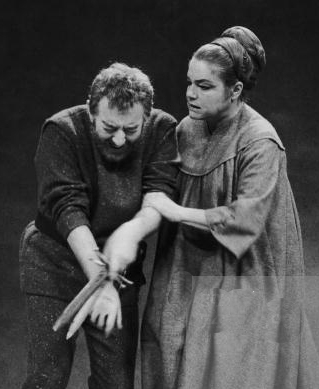Anne Fielding |
|
Aesthetic Realism Seminar
Ambition in Marriage: True & False By Anne Fielding
Here are the words of a wife in a famous play talking to herself; a woman who thinks that in order to be happy, her husband must be great and powerful. And as she soliloquizes she tries to harden herself to achieve that purpose:
Lady Macbeth of 11th century Scotland, presented by William Shakespeare, shows that contempt in wives has been around for a long time—interfering always with a wife's happiness. As she asks the spirits to give her less feeling for people, she is desperately contemporary and represents an ambition of married women everywhere. In The Right of Aesthetic Realism to Be Known #160, titled "The Suppression of Good Will," Eli Siegel explained:
Mr. Siegel is the greatest friend to every wife and husband, and I love him. In lessons and classes taught by him, my contempt and ill will were criticized, and I learned that the one ambition that makes a woman self-respecting and happy is the ambition to have good will—for one's husband and the world, people close and far away. Because I learned this I had a very happy marriage with the late Sheldon Kranz—a marriage which is a means of education to wives and husbands everywhere. 1. Does a Wife Want an Accomplice or Creative Encourager? Our greatest desire, Aesthetic Realism teaches, is to like the world we are in; and that is the purpose of marriage. If we use a husband for any other purpose, we're untrue to our first and deepest ambition, and in the process, we weaken ourselves and the man we married, encourage him to be false to himself. Mr. Siegel wrote in "An Outline of Aesthetic Realism":
There Are Wives has seen that this second, ugly ambition—to exclude the world contemptuously— works in many ways in wives. Since when a woman marries, she has likely already come to be against the world, it follows that she will want her husband to join her in fighting or getting rid of that world. Many a wife has assumed that her husband’s purpose is to make her more important than anything, and she feels that together they’re more important than all other people. All of this happens without any overt statement or declaration; we accrue contempt in marriage the way dust accumulates under a sofa; quietly. And it has results. “Contempt,” Mr. Siegel explained,
This “miserable flower,” There Are Wives has seen, takes hundreds of forms, most of them very ordinary. In an Aesthetic Realism lesson that took place a few months after Sheldon and I were married, Mr. Siegel asked my husband something which should be asked of every man and woman preparing for the nuptial state. “Do you want to use Anne Fielding as your accomplice or your creative encouragement?”
That word “accomplice”—how terrible and how fitting it is! For when a wife and husband don’t have as their conscious ambition to use each other to like the world, to see meaning in it, to value people truly, they are committing a deep crime—and causing themselves great unhappiness. Every time we have contempt, we rob the world of meaning, and rob the very person who may be our accomplice. Today, when marriages are suffering tremendously from economic hardship, when men and women are so worried about putting food on the table, providing clothes for their children, every couple needs to learn this. “Do you think,” There Are Wives asked in an Understanding Marriage class, “There there’s a desire in a woman to feel the outside world, including what a husband is concerned about, is an interference with herself? “Oh, yes,” answered Jackie Morrell of Philadelphia, a young wife and mother of two. “Can you give an instance? Think of your last irritation with Mr. Morrell.” Mrs. Morrell told of a quarrel she and her husband had at night in bed. He was scared about losing his job, afraid he wasn’t going to make the mortgage payment on their house, and he wanted to talk. She was tired—and, she said, “I just didn’t want any part of him. That’s contempt, isn’t it?”
Extinguishing the world’s meaning in hundreds of everyday ways is, unfortunately, very common as two people live together. And hurtfully, this attitude is encouraged by the women’s magazines—which imply that it’s perfectly all right to kick out the world, because after all “a woman needs time for herself.” In an Aesthetic Realism lesson for which I am eternally grateful, when Sheldon and I told about a quarrel we’d had after returning home from a party at which we’d had a very good time talking with people, Mr. Siegel explained, Eli Siegel. It is a tendency of humanity—again and again people have, consciously or unconscious, used themselves o shut the rest of the world out. It’s their greatest victory and their greatest defeat. And he also explained the reason why, as we came into the house and closed the door, we suddenly got furious with each other, and didn’t understand why. “What I gather,” he said, “is that at the party you tried to be honest and talk in a pretty good way, but when you came home alone, you shifted gears and could talk only of yourselves.”
I think Mr. Siegel for this explanation. I saw that I hadn’t wholly liked Sheldon’t interest in other people, that I felt he existed mainly to praise me, to “protect” me from other people who might dare to criticize me, and to make me supreme. However we do this, we’ve succumbed to that anti-world feeling—contempt—and we’ve used our husband as an accomplice. Said Mr. Siegel, “In the process of not liking yourselves, you get angry in a way that takes in the other. Aesthetic Realism agrees with Shakespeare; that it’s impossible to be true to yourself and unjust to another.” And he described, magnificiently, three inevitable results of inter-contempt in marriage, when he said:
“Out of these three,” stated Mr. Siegel, “cauldrons bubble.” And so we come to the famous anti-world couple of medieval Scotland: Macbeth and his lady; accompanied by those three feminine votaries of contempt, who delight in saying: “Double, double, toil and trouble; fire burn and cauldron bubble.” “Yes,” wrote Mr. Siegel in The Right Of #137, “it would be good to look at the drama of the world to see what plays have said about contempt.” 2. A Wife’s Ambition Interferes with Her Own Happiness What this play of 1606 says about a wife’s contempt is told swiftly in lines from “Shakespeare Compactly,” in Eli Siegel’s book Hot Afternoons Have Been in Montana: Poems:
“Is anyone here like Lady Macbeth?,” we asked in the Understanding Marriage class. “Of course not. The Macbeths murder people, and we don’t do that.” Yet, when we quietly extinguish the meaning of another person in our mind, what are we doing? When we, in the privacy of our boudoir, say “killing” things about the friends we have just left at the party, what are we doing? And when, as Mr. Siegel said in the lesson, we use our husbands to shut the rest of the world out, what are we doing? Looking closely at the play, we see that the Scottish wife is only, as she sees it, trying to be happy and have a good life for herself; and like many wives she feels the man she married is too sluggish to make it on his own; he’s too easy-going, doesn’t have enough get-up and go; is too soft-hearted. “Yet I do fear thy nature,” Lady Macbeth says to her husband,
How many wives, under the guise of caring for a husband, have berated him, saying: “You’re too gullible; you let people take advantage of you.” Is this not, in its homey way, like Lady Macbeth of centuries ago? Jackie Morrell had talked this way to her husband about the people he worked with. In his lecture, “Mind and Ambition,” Mr. Siegel said: “You can urge a person on, make him go through the motions of energy, either through sarcasm or through making him feel he’s the biggest person going, and wives do both.” From the moment she hears, in a letter from her husband, about his meeting the three witches and their prediction that he, Macbeth, will be king, Lady Macbeth’s ugly ambition accelerates, and she says, in effect: Take away all feeling from me: I have to manage! At that moment the opposites of being affected and affecting, of yielding and assertion, of gentleness and hardness in her, are told to despise each other. “Leave all the rest to me,” she tells her somewhat doubtful husband, as she eggs him on to kill Duncan, the king, who is their honored guest; and when Macveth says he can’t go through with it, like many a wife tonight who wants her husband to get ahead in business, she prods him, saying contemptuously, so why did you bring it up in the first place?
This is the wife whom Macbeth has called “My dearest partner of greatness,” and, endearingly, “my dearest chuck.” So they talk; and she works on him; and he listens. The question asked of my husband in the lesson I quoted earlier: “Do you want to use [your wife] as your creative encouragement or your accomplice?”—is a question this husband is never asked. The Macbeths exemplify a phrase Mr. Siegel once used to describe the anti-world collaboration between husband and wife: coupleitis. It is, he said, “the deficiencies of the ego made double,” and it flares up during many an intimate conversation. “But I think these are the important parts of marriage,” said Frances Warren in the Understanding Marriage class I have quoted from, “when you both communicate with each other.” “Yes,” said Mrs. Morrell, “But I’m learning that unless the outside world and other people are seen with meaning at the same time, there’s something too close, too suffocating about it.” After the suffocating, close conversation between the Macbeths, there is murder; Duncan and the men who guard him are killed by the couple who spoke so intimately moments earlier; and then, as her husband begins to tell his guilty thoughts, his wife says, as wise are doing this very moment in apartments and homes: “Consider it not so deeply,” meaning, “Forget it!” “Fie, for shame!” she chides him; and later when he tells of seeing a vision of Banquo, the friend he has also killed—because contempt has accelerated and the murders have not stopped with Duncan—she says scornfully, “Oh, proper stuff!”—meaning, “Oh, you’re talking nonsense!” Said Mr. Siegel in The Right Of:
3. A Wife's Ambition Can Change And Lady Macbeth comes to have this “blankness of feeling, terrifying in its vacuity.” Because she has denied the flesh-and-blood reality of Duncan, Banquo, and other people, and because she has betrayed the deepest hope of her husband—this wife will soon be impelled by a power she cannot manage, to walk in her sleep, to forever wash her hands which still smell of murder, and to ask in horror: “Yet who would have thought the old man to have had so much blood in him?” That is a question which is beautiful in its terror. The opposites of affecting and being affected, of hardness and softness have changed hands; and after all her managing, something now is running Lady Macbeth—beyond her control. What woman has not suddenly awakened in the night with the sense that something horrible has happened? Do we know all the perils of everyday contempt, of using a husband “to shut the rest of the world out”? In a class for consultants and associates, Ellen Reiss, Chairman of Education, explained:
Soon, Lady Macbeth, walking in her sleep, will say:
In a class, Mr. Siegel once asked a woman, “Do you think there’s a touch of Lady Macbeth in every wife?” “Yes,” she answered. “Yes,” said Mr. Siegel, “and Lady Macbeth is proud of that. Still,” he said, “she’d like it to change.” So what will have it change? The answer is: the necessary and grand study of what it means to like the world through another person. In the Understanding Marriage class, we asked Mrs. Morrell:
Her gratitude stands for me and women everywhere—because to be able to learn how we may have ambition of a false kind and interfere with our own happiness, is the beginning of a tremendously important change in the direction of our thought and our life. That is why the study of Aesthetic Realism is what the wives of America and the world are hoping for! |



